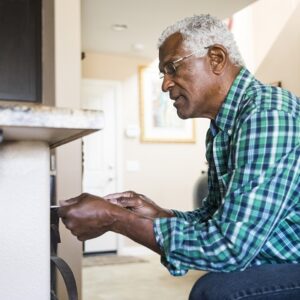Safety Starts at Home
June 17, 2023

June is National Safety Month, a time to raise awareness about home safety for older adults. As we get older, our needs and abilities may change. It’s worth taking a look around our homes to make sure that our environment is safe and secure for aging adults. Here are some things to keep in mind when considering the safety of your home.
Fall prevention: Falls are a significant concern for older adults, and the National Council on Aging tells us that most of these falls happen in the home. To minimize your risk, make sure your home is free of clutter, remove tripping hazards like loose rugs or wires, and ensure that stairways have sturdy handrails.
Adequate lighting: It’s easy to ignore those hard-to-reach lightbulbs that may have gone out months ago. But good lighting is crucial for visibility and preventing accidents. Make sure all areas of the home are well-lit, especially hallways, staircases, and entrances. Use nightlights in bedrooms and bathrooms to navigate safely at night.
Fire safety: Are those smoke detectors still working? When’s the last time you checked the batteries? Safety month is a great time to make sure you are prepared in case of an emergency. Install smoke detectors on every level of the home and near sleeping areas. Test them regularly and replace batteries as needed. Develop a fire escape plan with clear exit routes and practice it. Keep a fire extinguisher in the kitchen and learn how to use it properly.
Medication management: If you take multiple medications, it’s important to organize and store them safely. Use pill organizers to avoid confusion and follow prescribed dosages strictly. Keep a list of your medications, including dosages and schedules, and share it with a trusted friend of family member.
Home security: Older adults may be more vulnerable to burglaries or scams. Install proper locks on doors and windows, and consider using a home security system or cameras. Be cautious of unsolicited calls or visitors, and don’t share personal or financial information with unknown individuals.
Emergency preparedness: Stock an emergency kit readily available with essential supplies such as non-perishable food, water, medications, a flashlight, batteries, and a first aid kit. Create a list of emergency contacts and keep it in a visible place.
Electrical safety: Check electrical cords and outlets regularly for any signs of damage. Avoid overloading outlets and use surge protectors with expensive electronics that could be damaged by a power surge.
Bathroom safety: Bathrooms can be hazardous areas. Consider installing grab bars near the toilet and in the shower or bathtub. Even if you don’t need them now, they may be helpful in the future. Use non-slip mats on the floor and in the tub or shower. Raised toilet seats and shower chairs may help if you or a family member has mobility or balance issues.
Regular maintenance: Keep up with regular home maintenance. Repair loose handrails, broken steps, or unstable furniture. Have heating and cooling systems, as well as other appliances, checked and serviced regularly.
If this all feels overwhelming, don’t fret! There are many professional services that can assist in making your home as safe as possible. Some may even be discounted or free depending on your income or status as a veteran. Contact your local Area Agency on Aging to learn more.
